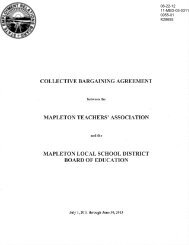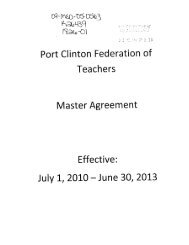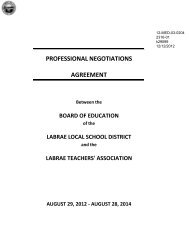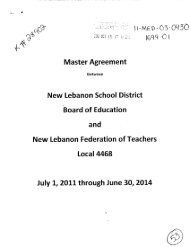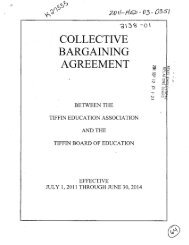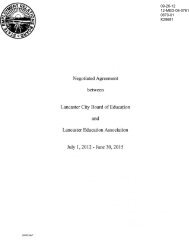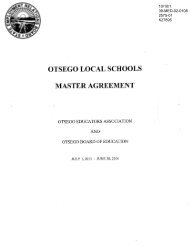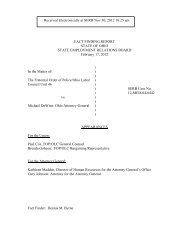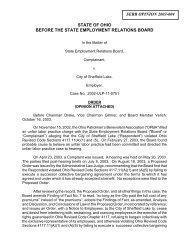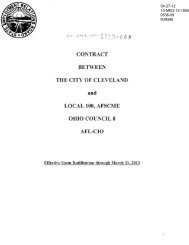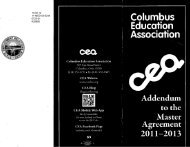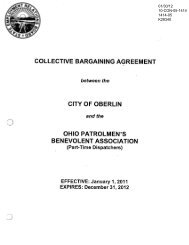THE MASTER CONTRACT - State Employment Relations Board ...
THE MASTER CONTRACT - State Employment Relations Board ...
THE MASTER CONTRACT - State Employment Relations Board ...
Create successful ePaper yourself
Turn your PDF publications into a flip-book with our unique Google optimized e-Paper software.
613 STUDENT DISCIPLINE (P.N. 2009)<br />
A teacher shall refer to the Principal or his/her representative, for appropriate action, any student who<br />
seriously interferes with the learning opportunities of other children in the classroom, or who fails to<br />
comply with a teacher's reasonable request in any school setting. The teacher will communicate in<br />
writing on a completed Student Behavior Referral Form or, in cases of emergency in person, the<br />
nature of the problem and any steps the teacher has taken to remediate the problem, to the appropriate<br />
Administrator. A completed Student Behavior Referral Form (SBR) [Appendix E] shall be returned<br />
to the teacher by the appropriate Administrator within two (2) school days of the referral. Efforts will<br />
be made to communicate with the teacher upon receipt of the referral reflecting the action taken by<br />
the Administrator.<br />
During the first staff meeting at each building for a new school year, the student code of conduct will<br />
be distributed and discussed, specific to discipline related concerns. The information shared will<br />
include a discussion of the forms and processes the staff and administration will follow in handling<br />
student discipline matters.<br />
614 EDUCATION OF STUDENTS WITH DISABILITIES (P.N. 2012)<br />
A. The Association and the <strong>Board</strong> recognize the District's obligation to provide a free appropriate<br />
public education for students with disabilities under IDEA and/or Section 504. The parties<br />
further recognize that federal and state statutes and regulations require that disabled students be<br />
educated "to the maximum extent appropriate" with children who are not handicapped by<br />
providing special education, related services, and supplemental aids and services in the least<br />
restrictive environment. In providing a free appropriate public education, the parties<br />
acknowledge that the needs of each individual disabled student will dictate the environment in<br />
which the child is educated and that each student's educational plan will be developed in<br />
accordance with their individual special needs.<br />
B. Recognizing these statutory obligations, the continuum of options available to disabled<br />
students, and the potential impact and additional teacher workload of these obligations and<br />
options in a regular education classroom setting, the following factors will be considered:<br />
1. The educational benefits both academic and nonacademic, available to a disabled student<br />
in the regular classroom setting and the disabled student's progress, with appropriate<br />
supplemental aids and services;<br />
2. The effects and impact of the disabled student's inclusion in the regular education<br />
classroom setting upon the other children in the class, both positive and negative (e.g.<br />
unreasonable classroom disruptions or diversion of instruction time despite appropriate<br />
supplemental aids or services); and<br />
3. The cost of necessary supplementary services.<br />
C. Any teacher involved in educating a student who is being served under an IEP or 504 Plan will<br />
be given a copy of that plan and will be given the opportunity to provide input and feedback in<br />
the development (where possible), implementation or revision of that plan. The IEP/504 Plan<br />
will designate the individual to whom the teacher should go to discuss questions and concerns<br />
related to 614/B, above, or seek revisions or interventions.<br />
D. Recognizing that special classes, separate schooling, or removal of children with disabilities<br />
from the regular education environment may occur only when the nature or severity of the<br />
disability is such that education in regular classes with the use of supplementary aids and<br />
services cannot be achieved satisfactorily, the District will be proactive in:<br />
30



